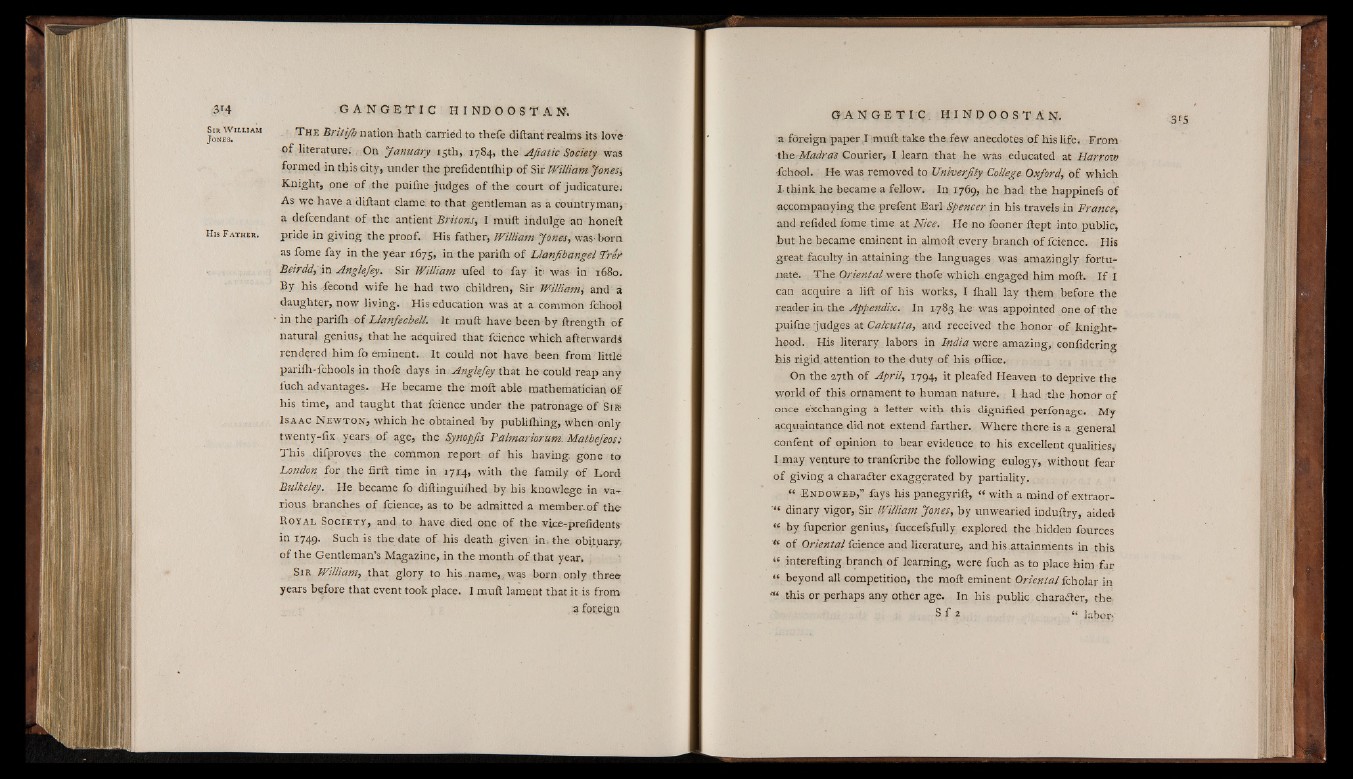
Sir W il l iam
J ones.
His F a th e r ,
T h e Britijb nation hath carried to thefe diftant realms its love
o f literature, On January 15th, 1784, the Afiatic Society was
formed in this city, under the prefidentfhip of Sir William Jones',
Knight, one of the puifne judges of the court o f judicature;
As we have a diftant clame. to that gentleman as a countryman,
a deicendant o f the antient Britons, I muft indulge an honeft
pride in giving the proof. His father, William Jdnes, was born
as fome fay in the year 1675, in the pariih o f Llanfibangel Trer
£eirdd, 'm Anglejey. Sir William ufed to fay it' was in 1680.
By his feeond wife he had two children, Sir Williami and a
daughter, now living. His education was at a common fchool
in the pariih o f Llanfechell. It muft have been by ftrength of
natural genius, that he acquired that fcience which afterwards
rendered him fo eminent. It could not have been from little
pariih-fchools in thofe days in Anglejey that he could reap any
luch advantages. He became the moft able mathematician of
his time, and taught that fcience under the patronage o f S i r
I s a a c N e w t o n , which he obtained by publiihing, when only
twenty-fix years o f age, the Synopfis Palmariorum. Matbefeos;
This difproves the common report o f his having, gone to
London for the firft time in 1714, with the family of Lord
Bulkeley. He became fo diftinguiihed by his knowlege in various
branches of fcience, as to be admitted a member, o f the
R o y a l S o c i e t y , and to have died one of the vice-prefidents
in 1749. Such is the date o f his death-given in. the. obituary,
of the Gentleman’s Magazine, in the month o f that year, (
S i r William, that glory to his name,, was born only three
years before that event took place. I muft lament that it is from
a foreign
G A N G E T I C H I N D O O S T A N .
a fdreign paper I muft take the.few anecdotes of his life. From
the Madras Courier, I learn that he was educated at Harrow
•fchool. He was removed to Univerjity College, Oxford\ of which
I think he became a fellow. In 1769, he had the happinefs of
accompanying the prefent Earl Spencer in his travels in France,
and refided fome time at Nice. He no fooner ftep't into public,
but he became eminent in almoft every branch o f fcience. His
great faculty in attaining the languages was amazingly fortunate.
The Oriental were thofe which engaged him moft. If I
can acquire a lift o f his works, I ihall lay them before the
reader in the Appendix. In 1783 he was appointed one o f the
puifne judges at Calcutta, and received the honor o f knighthood.
His literary labors in India were amazing, confidering
his rigid, attention to the duty of his office.
On the 27th of April, 1794, it pleafed Heaven to deprive the
world of this ornament to human nature. I -had .the honor of
once exchanging a letter with this dignified peifonage. My
acquaintance did not extend farther. Where there is a general
confent of opinion to bear evidence to his excellent qualities,’
I may venture to tranfcribe the following eulogy, without fear
of giving a character exaggerated by partiality.
“ E n d o w e d , ” fays his panegyrift, “ with a mind o f extraor-
“ dinary vigor, Sir William Jones, by unwearied induftry, aided
“ by fuperior genius, fuccefsfully explored the hidden fources
" o f Oriental fcience and literature, and his .attainments in this
“ interefting branch o f learning, were fuch as to place him far
“ beyond all competition, the moft eminent Oriental fcholar in
this or perhaps any other age. In his public character, the
S f 2 “ labor